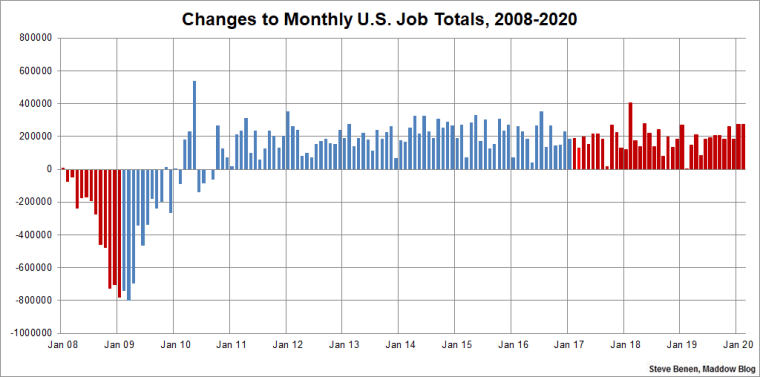Ahead of this morning's jobs report, most projections pointed to growth in February in the ballpark of 165,000. It looks like we did significantly better than that.
The Bureau of Labor Statistics reported this morning that the economy added 273,000 jobs last month, while the unemployment rate inched a little lower, returning to 3.5%. The revisions from December and January were also revised up quite a bit, adding 85,000 jobs to previous reporting.
The good news is, this latest jobs report looks terrific. Indeed, between January and February, these are the best back-to-back months for job creation since 2016. The bad news is, the new report doesn't fully reflect the effect the coronavirus outbreak has had on the domestic economy. As the Wall Street Journal reported overnight, "The coronavirus outbreak likely had minimal impact, if any, on the U.S. job market in February. Companies by and large were surveyed about their employee head count before the virus became an escalating U.S. concern."
We'll get a better sense of the virus' impact on job creation in the coming months.
As for the political implications, Trump has now been in office for 37 full months -- February 2017 through February 2020 -- and in that time, the economy has created 6.92 million jobs. In the 37 months preceding Trump's presidency -- January 2014 to January 2017 -- the economy created 8.25 million jobs.
As regular readers know, some have asked what would happen if we looked at the same numbers, but assigned the job totals from January 2017 to Trump, even though Obama was president for most of the month. On balance, I think that paints a misleading picture, but it doesn't change the underlying dynamic: if we applied jobs from January 2017 to Trump and compared the last 38 months to the previous 38 months, job totals still slowed from 8.40 million to 7.10 million.
The White House, meanwhile, believes we should actually start the clock for Trump at November 2016 -- the month of the Republican's election -- and apply the jobs created during the final months of the Obama era to the current Republican president. But that still doesn't help: if we compare the last 40 months to the previous 40 months, job totals slowed from 8.79 million to 7.48 million.
Trump continues to tell the world that he's overseeing the strongest domestic job growth in American history, which is plainly false. What's more, the White House has not yet offered an explanation for why job growth has slowed since Trump took office.
Above you'll find the chart I run every month, showing monthly changes in total jobs since the start of the Great Recession. The image makes a distinction: red columns point to monthly changes under the Bush and Trump administrations, while blue columns point to monthly job changes under the Obama administration.

